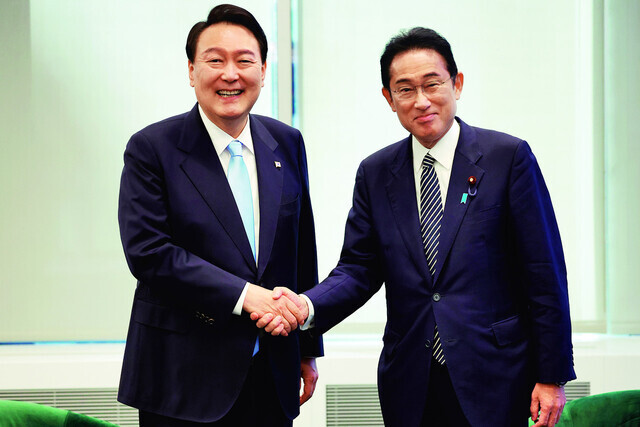hankyoreh
Links to other country sites 다른 나라 사이트 링크
[Editorial] Limits of cooperation with US, Japan for solving Korean Peninsula problems

North Korea launched more short-range ballistic missiles on Thursday. An American aircraft carrier took part in another joint military exercise with South Korea and Japan in the East Sea on the same day, and South Korean President Yoon Suk-yeol and Japanese Prime Minister Fumio Kishida agreed during a phone call that their two countries would keep cooperating on making a stern response to North Korea.
On the same day, North Korea sent a formation of 12 jet fighters and bombers south of the “special reconnaissance line” defined by the South Korean military in a show of force. South Korea responded by scrambling 30 jets of its own. The Korean Peninsula is entering a vicious spiral of antagonism with no exit in sight.
North Korea’s launch of two ballistic missiles into the East Sea on Thursday morning was the sixth such launch in the past 12 days. The same day, South Korea, the US and Japan responded to the test by carrying out a missile defense exercise in international waters in the East Sea.
That trilateral exercise came six days after they carried out their first joint anti-submarine drills in international waters on Sept. 30. The USS Ronald Reagan, an aircraft carrier that had departed the waters around the Korean Peninsula, returned to the East Sea on Wednesday evening to take part in the latest round of drills.
North Korea’s Foreign Ministry released an official statement criticizing the reappearance of the American aircraft carrier. That statement appeared to both signal that the missile launch on Thursday was a show of force in response to the South Korea-US-Japan joint exercises and to lay the groundwork for tougher military action, including a nuclear weapon test.
The only response apparently being considered by the Yoon administration is to strengthen trilateral military cooperation with the US and Japan. “We will fully protect the lives and safety of the Korean public through the powerful South Korea-US alliance and South Korea-US-Japan security cooperation,” Yoon said in response to North Korea’s missile launch.
South Korea’s presidential office said that Yoon and Kishida, the Japanese prime minister, agreed in a 25-minute phone call on Thursday to “not only continue trilateral security cooperation between South Korea, the US and Japan but also to maintain firm solidarity with the international community, including the UN Security Council.” That was designed to “send a clear message to North Korea that provocations have consequences.”
South Korea needs to improve its relations with Japan, but it’s accelerating military cooperation on the North Korean missile and nuclear weapon issues even though Japan keeps insisting that South Korea come up with its own solution to pending issues, including compensation for Koreans conscripted for labor during the Japanese colonial period. That will surely weaken Seoul’s diplomatic leverage for reaching solutions on these major pending issues.
The Yoon administration must avoid rushing into actions that it hopes will bring the kind of improvement in South Korea-Japan relations that eluded the previous administration.
We need to strengthen our security posture in response to North Korean provocations, but we should also take into account the differences between our three countries’ strategic interests.
As South Korea strengthens military ties with the US and Japan, concerns will grow about a crisis, including the possibility of an accidental clash. Allowing the current showdown between South Korea, the US and Japan on one side and North Korea, China and Russia on the other to become protracted would surely place a heavy burden on South Korea’s national security.
Please direct questions or comments to [english@hani.co.kr]

Editorial・opinion
![[Editorial] Penalties for airing allegations against Korea’s first lady endanger free press [Editorial] Penalties for airing allegations against Korea’s first lady endanger free press](https://flexible.img.hani.co.kr/flexible/normal/500/300/imgdb/original/2024/0502/1817146398095106.jpg) [Editorial] Penalties for airing allegations against Korea’s first lady endanger free press
[Editorial] Penalties for airing allegations against Korea’s first lady endanger free press![[Editorial] Yoon must halt procurement of SM-3 interceptor missiles [Editorial] Yoon must halt procurement of SM-3 interceptor missiles](https://flexible.img.hani.co.kr/flexible/normal/500/300/imgdb/child/2024/0501/17145495551605_1717145495195344.jpg) [Editorial] Yoon must halt procurement of SM-3 interceptor missiles
[Editorial] Yoon must halt procurement of SM-3 interceptor missiles- [Guest essay] Maybe Korea’s rapid population decline is an opportunity, not a crisis
- [Column] Can Yoon steer diplomacy with Russia, China back on track?
- [Column] Season 2 of special prosecutor probe may be coming to Korea soon
- [Column] Park Geun-hye déjà vu in Yoon Suk-yeol
- [Editorial] New weight of N. Korea’s nuclear threats makes dialogue all the more urgent
- [Guest essay] The real reason Korea’s new right wants to dub Rhee a founding father
- [Column] ‘Choson’: Is it time we start referring to N. Korea in its own terms?
- [Editorial] Japan’s rewriting of history with Korea has gone too far
Most viewed articles
- 11 in 3 S. Korean security experts support nuclear armament, CSIS finds
- 2Months and months of overdue wages are pushing migrant workers in Korea into debt
- 3Bills for Itaewon crush inquiry, special counsel probe into Marine’s death pass National Assembly
- 4[Reporter’s notebook] In Min’s world, she’s the artist — and NewJeans is her art
- 5[Editorial] Penalties for airing allegations against Korea’s first lady endanger free press
- 6S. Korean Defense Ministry rejects petition from Vietnam War civilian massacre survivors
- 7[Column] Can Yoon steer diplomacy with Russia, China back on track?
- 8[Reportage] A petition of tears by victims of civilian massacres during Vietnam War
- 9Civic groups demand S. Korean government take responsibility for Vietnam War civilian massacres
- 10Another court rules NIS to release data on Vietnam War civilian massacres